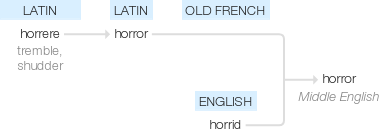Horror
Middle English: via Old French from Latin horror, from horrere ‘tremble, shudder’ (see horrid).
wiktionary
From Middle English horer, horrour, from Old French horror, from Latin horror(“a bristling, a shaking, trembling as with cold or fear, terror”), from horrere(“to bristle, shake, be terrified”). Displaced native Old English ōga.
etymonline
horror (n.)
early 14c., "feeling of disgust;" late 14c., "emotion of horror or dread," also "thing which excites horror," from Old French horror (12c., Modern French horreur) and directly from Latin horror "dread, veneration, religious awe," a figurative use, literally "a shaking, trembling (as with cold or fear), shudder, chill," from horrere "to bristle with fear, shudder," from PIE root *ghers- "to bristle" (source also of Sanskrit harsate "bristles," Avestan zarshayamna- "ruffling one's feathers," Latin eris (genitive) "hedgehog," Welsh garw "rough").
Also formerly in English "a shivering," especially as a symptom of disease or in reaction to a sour or bitter taste (1530s); "erection of the hairs on the skin" (1650s); "a ruffling as of water surface" (1630s). As a genre in film, 1934. Chamber of horrors originally (1849) was a gallery of notorious criminals in Madame Tussaud's wax exhibition. Other noun forms are horribility (14c., now rare or disused), horribleness (late 14c.), horridity (1620s), horridness (1610s).
